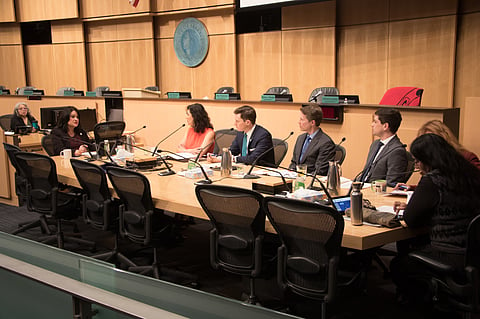Seattle Council Bans Use of Chokeholds and "Less-Lethal" Weapons by Police
Erica C. Barnett
The Seattle City Council voted unanimously today to ban the Seattle Police Department from owning or using so-called "less lethal" weapons such as blast balls, tear gas, and pepper spray for any purpose, and, in separate legislation, to ban the use of "chokeholds," a term that includes various methods of restraining a person by cutting off their air supply or blood flow to their brain.
City council member Lisa Herbold, who chairs the council's public safety committee, had proposed delaying the legislation barring less-lethal weapons for one week at the request of the Office of Police Accountability and the Office of Inspector General, which asked the council for one week to review the legislation and make recommendations. The OPA and OIG, along with the Community Police Commission, are the three accountability groups charged with implementing and overseeing police reforms required by a 2012 federal consent decree.
Delaying a week would not have allowed police to resume the use of blast balls, tear gas, and other weapons against protesters, thanks to a federal court ruling from Friday, June 12, barring the use of force against peaceful protesters for two weeks. However, council member Kshama Sawant, who sponsored the legislation, said on Monday morning that she was "at a loss to understand how any council member can play a role in delaying the passage of what is absolutely bare minimum legislation."
Sawant continued to inveigh against Herbold at the full council meeting at 2pm, calling an amendment that would allow police to use non-lethal weapons under circumstances unrelated to free speech or "crowd control," such as subduing individual suspects, "nothing less than a racist amendment [and] a betrayal of the movement and the Black community." Earlier, Sawant called the same amendment "horrific" and suggested that it would "create giant, truck-sized loopholes that will allow these weapons to be used in virtually any situation."
Herbold's amendment mirrored language adopted by the Community Police Commission in 2015 and in 2020 recommending a ban on these weapons specifically for crowd control purposes. The CPC, OIG, and OPA have not weighed in on whether less-lethal weapons should be banned outright, a move Herbold — a longtime advocate for police reform — said she worries could have unintended consequences.
Herbold didn't directly address Sawant's accusation, but did agree to withdraw the portion of her amendment to Sawant's bill that would have allowed less-lethal weapons to be used for purposes other than crowd control. Her amendment, which ultimately passed, added language to Sawant's bill asking the OPA, CPC, and OIG to "make a formal recommendation to the City Council on whether the Seattle Police Department should be reauthorized to use less-lethal weapons for crowd dispersal purposes" by August 15.
The council is sending the legislation to the Department of Justice, Federal District Court Judge James Robart, who presides over the consent decree, and court monitor Merrick Bobb, who was appointed to oversee the decree. The consent decree is an agreement, signed by the city in 2012, that committed the city to police reform after the federal court found a pattern of excessive force and racially biased policing.
In early May, Mayor Jenny Durkan asked the judge to find the city in long-term compliance with federally mandated reforms, one of the final steps before the dissolution of federal oversight of SPD. Less than three weeks later, George Floyd was murdered in Minneapolis and police in Seattle responded to mostly peaceful protests with violent force.
The discussions about less-lethal weapons are just the first phase of talks about the size and purpose of the police department, which will continue on Wednesday at 2 p.m. with a discussion in the council's budget committee about proposals to defund the department and invest in community organizations that provide alternative approaches to community safety and prosperity.
Erica C. Barnett has covered Seattle politics since 2001 for print and online media. Read her latest at The C Is for Crank.
Featured image sourced from the Seattle City Council's Flickr account
Help keep BIPOC-led, community-powered journalism free — become a Rainmaker today.


